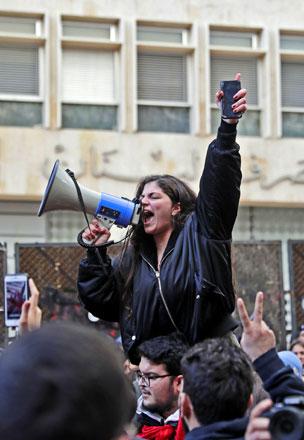You are here
'Banks don't care': Lebanese scream for their dollars
By AFP - Dec 31,2019 - Last updated at Dec 31,2019

A Lebanese protester shouts slogans during a protest in front of the central bank headquarters in the capital Beirut to protest against the economic policies of the bank on Monday (AFP photo)
BEIRUT — Inside a Lebanese bank, a woman screams for her salary. A man pounds his fist on the marble counter, demanding the teller release $200. In crisis-hit Lebanon, this is the new normal.
"It's a shocking experience," said Khaled Taki, a 68-year-old consultant whose bank last week refused to hand him any dollars from his account.
"You have money in the bank, you go there to get it, and they tell you: No."
A grinding liquidity crunch has hit Lebanon, where unprecedented protests since October 17 have railed against the political class and a deepening economic crisis.
Since September, banks have restricted the amount of dollars that can be withdrawn or transferred abroad.
Although no formal policy is in place, most have arbitrarily capped withdrawals at around $1,000 a month, while others have imposed tighter restrictions.
With ordinary depositors bearing the brunt of these measures, bank branches have transformed into arenas of conflict.
Fistfights, shouting and tears abound, as cash-hungry clients haggle tellers to release money trapped under informal capital controls.
Security personnel pace nervously, eying angry customers.
Large crowds form near the ATMs outside until the machines suddenly stop dispensing cash.
"I have seen a woman begging — literally begging the bank employee — and going on the floor and kissing it, asking for her money," said Taki.
But "the banks don't care", he said.
"They have your money, and they will give it to you when they want to, just like a father giving his son a weekly allowance."
Trapped dollar savings
For decades, Lebanon's commercial banks have been the main conduit of foreign currency entering Lebanon, via deposits from investors and the country's wide-reaching diaspora.
But a severe slowdown in foreign currency injections has hampered dwindling reserves in a highly dollarised economy where the Lebanese pound and the greenback are used interchangeably in everyday life.
In November, two credit rating agencies downgraded Lebanon's top banks further into junk territory, citing liquidity pressures.
In a report that same month, the Bank of America said Lebanon's foreign exchange reserves could run out by the middle of 2020 if they continue to plummet quickly.
With no fresh currency coming in from outside due to increasing capital restrictions, “time could be rapidly running out”, it warned.
Amid the depletion of foreign currency, dollar-hungry banks are now “trying to transfer their losses onto the public”, said Sami Halabi, director of the Beirut-based research and policy firm Triangle.
By trapping dollar savings, banks are increasingly forcing the public to deal with the plummeting Lebanese pound, in what experts are calling a de-facto haircut.
The local currency has lost around 30 per cent of its value on the unofficial exchange market for the first time since it was pegged to the dollar at 1,500 Lebanese pounds in 1997.
“The reputation of the banks has become completely tarnished,” Halabi told AFP.
“No one is going to trust them for years.”
‘Financial nightmare’
The restrictions have sparked panic in debt-ridden Lebanon, where protesters are demanding the removal of a political class they deem incompetent and corrupt.
A video circulating on social media shows a customer pulling out an axe in the middle of a bank while he screams at employees who refused to hand him his money.
In the northern city of Tripoli, a single soldier struggled to break up a fist fight between a handful of bank employees and a group of angry customers.
As demonstrations enter their third month, protesters are also increasingly targeting banks, which they say are robbing people of their hard-earned savings.
They have staged impromptu demonstrations inside branches, during the Christmas holidays singing carols to relay their message.
Even outside Lebanon, depositors are feeling the pinch.
Rana, a 47-year-old expatriate, says she has been living a “financial nightmare”.
Since October, her bank has blocked transfers to a construction firm building her house in Europe — a move she says could land her in jail.
Allowed access to only 1,000 dollars a month, she says she can barely cover rent in Italy, let alone pay the $30,000 she owes the construction company.
“The capital controls ruined my life,” said the advertising professional who left Lebanon two years ago.
“They turned my life from a good one into a needy one.”
Her bank, however, had called the access to dollars she does have “a miracle”.
“No one is able to move $1,000 out of Beirut,” she said they told her in a message after she filed several complaints.
Related Articles
BEIRUT — Eighteen-year-old domestic worker Mary came to Lebanon to help support her family, but now a financial crisis is preventing her fro
BEIRUT — Talks between crisis-hit Lebanon and the International Monetary Fund are deadlocked, and leaders are reluctant to enact refor
BEIRUT — Lebanon's central bank on Sunday announced a "conditional" plan that would allow depositors, hit by strangling financial restrictio













